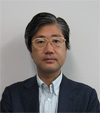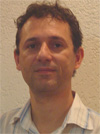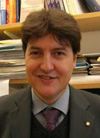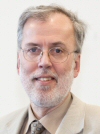|
|
4. Materials for Sustainable Production
| Key note lecture |
 |
Makio Naito
Nagoya University, Japan
E-mail: m-naito@jwri.osaka-u.ac.jp
Professor Makio Naito - Director of Smart Processing Research Center, JWRI - Osaka University., Osaka, Japan.
He worked at the R&D Division, Hosokawa Micron Corporation, Osaka, Japan (1982-1993).
He was Deputy Director of Tsukuba R&D Center (1993).
From 1993 till 2002 he worked at the Japan Fine Ceramics Center (JFCC), Nagoya, Japan.
He was Deputy Director of the R&D Center (2000-2002) and Professor at the Joining and Welding Research Institute (JWRI), Osaka University Japan (2002 - ).
He was Director at the Institute of Nanotechnology and Material Science, Kurimoto Ltd., Osaka, Japan (2005 - 2007).
At present he is Director, Hosokawa Micron Corporation (2005 - ) and at the Smart Processing Research Center, JWRI, Osaka University, Japan (2007- ).
He received an award for Academic Studies of Powder Technology by The Society of Powder Technology (Japan 1994), the Richard M. Fulrath Award by The American Ceramic Society (2002), the IP Award by the Information Center of Particle Technology, Japan (2003). |
| Theme 1: Materials for Energy and Environment |
 |
Murilo Innocentini
University of Ribeirão Preto, Brazil
E-mail: muriloinnocentini@pq.cnpq.br
Murilo Daniel de Mello Innocentini graduated in 1991 in Chemical Engineering at Federal University of São Carlos (UFSCar), Brazil.
In 1993, he was involved in the development of aerosol monitoring devices during his M.Sc. work at UFSCar.
In 1997 he was awarded a year scholarship at the University of Birmingham, UK, where he did part of his PhD on gas cleaning at high temperatures.
From 1998-2003 he was a Postdoctoral Researcher at the Materials Engineering Department at UFSCar, where he worked with fluid dynamic characterization of ceramic foam filters and refractory castables.
Since 1998 he is Professor of Chemical Engineering and since 2003 a researcher and supervisor of Environmental Technology at University of Ribeirão Preto, Brazil.
Murilo Innocentini’s research interests include permeability evaluation of cellular porous media and development of cleaning technologies for air pollution control. |
| Theme 2: Materials for Health |
 |
Aldo R. Boccaccini
Imperial College London, U.K. – Department of Materials
E-mail: a.boccaccini@imperial.ac.uk
Prof. Aldo R. Boccaccini joined Imperial College London in August 2000. Previously, he had appointments at the Aachen University of Technology (Germany), University of Birmingham (UK), the University of California at San Diego (USA), and the Ilmenau University of Technology (Germany).
The research activities of Prof. Boccaccini are in the broad area of glasses, ceramics, and polymer/glass composites for biomedical, structural and/or functional applications. He is the author or co-author of more than 350 scientific papers and several book chapters.
Prof. Boccaccini has pioneered the use of electrophoretic deposition (EPD) for production of nanostructured materials and composites, including EPD of carbon nanotubes and the development of transparent glass matrix composite materials. In the last few years he has developed extensive research activities in the area of biomaterials and scaffold materials for tissue engineering applications and has pioneered the development of novel highly porous nanostructured bioactive and degradable composite scaffolds for bone and cardiac tissue engineering.
His achievements in the area of materials science have been recognized with the award of the Materials Science and Technology Prize 2003 by the Federation of European Materials Society (FEMS) and the Verulam Medal and Prize 2003 of the Institute of Materials Minerals and Mining (UK).
He is a member of the EU chapter of the Tissue Engineering and Regenerative Medicine International Society (TERMIS) and serves in the editorial board of several recognized international journals.
He is a member of two technical committees of the International Commission on Glass.
Prof. Boccaccini has been named an Ambassador of Imperial College London and international advisor to the Ministry of Science, Technology and Innovation of Argentina. |
| Theme 3: New Materials Processing Routes |
 |
Christian Oehr
Fraunhofer Institut, Germany
After studying at the Technical University of Clausthal-Zellerfeld and the University of Tuebingen, Christian Oehr finished his Ph.D.-Thesis "Plasmainduced depostion of thin films from metal-organic compounds" in 1987 under the direction of Prof. Dr. H. Suhr, at the University of Tuebingen. After a Postdoctoral stay at the University of Tuebingen and being a scientist at the Fraunhofer-Institute of Interfacial Engineering and Biotechnology, he is (since 1992) head of the Department of Interfacial Engineering at the Fraunhofer- Institute of Interfacial Engineering and Biotechnology (Stuttgart). In the department emphasis is laid on surface modification mainly of polymers for application in different branches (medical devices, automotive components, textiles, foils and non-woven and on development of separation membranes) using plasma assisted techniques. Since 1997 he is member in several Committees related to plasma technology and polymers on the national as well as on the European level. He is member of the management committee of the German network “AK PLASMA”, and therein chairman of the expert committee for plasma and polymer treatment. He is also one of the editors- in- chief of the scientific journal Plasma Processes and Polymers.
Publications:
http://www.igb.fhg.de/WWW/GF/GrenzflMem/Grenzflaechen/start.en.html |
|





